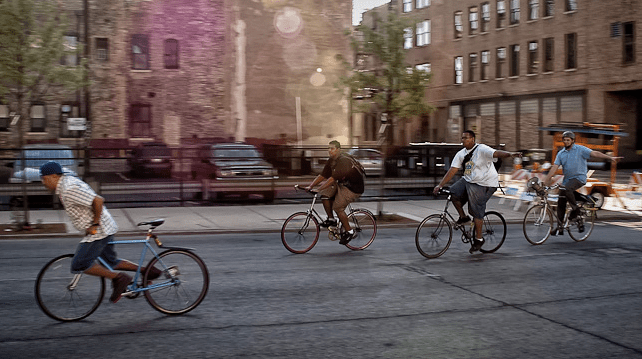A new survey conducted in Boston's Roxbury neighborhood shows that while people across different racial groups like protected bike lanes, there are variations in preferences that should inform design. In the survey, led by Anne Lusk of the Harvard School of Public Health, people of color were more likely than white people to favor indoor bicycle parking and bicycling with family and friends.
The survey focused on how to improve bicycling along Malcolm X Boulevard, which the administration of former Mayor Thomas Menino had identified as a priority for a protected bike lane in 2012. Conducted by mail and through face-to-face interviews along Malcolm X Boulevard in August 2014, it received a total of 372 responses.
The survey found that 81 percent of Hispanic respondents and 54 percent of black respondents would bicycle more if they could do it with family and friends, compared to 40 percent of white respondents.
It's hard to have this type of social riding experience with a single-file bike lane design. "We should be creating really wide cycle tracks so people can ride side by side," said Lusk.
The preference for protected bike lanes was strong across all races and ethnicities, with 100 percent of white, 79 percent of Hispanic, and 76 percent of black respondents seeing them as the safest of six bikeway types. But there were variations when it came to the details: 89 percent of white respondents liked trees and bushes as bike lane buffers, compared with 74 percent of Hispanic and 54 percent of black respondents -- a difference that Lusk said merits further study.
When asked where they preferred to park their bikes, 52 percent of Hispanic and 47 percent of black respondents said they would rather keep them inside their homes as opposed to a shed, porch, or other outside location, significantly higher than the 28 percent of white respondents who had the same preference.
The difference could reflect the different storage options available to respondents, but it could also be linked to the fact that black and Hispanic respondents were more likely to think their bike could get stolen, and would have fewer transportation options without it. “If you’re wealthier and your bike is stolen, it’s not as difficult to replace,” said Lusk. “If you perceive that your bike is going to get stolen, you don’t want to take the risk and leave it on a railing or in a communal room."
Lusk thinks roll-in, roll-out bicycle storage at home is an under-appreciated component of encouraging more people to bike. Ease of storage is particularly important for women and seniors, she said, who are less likely to lift bikes up stairs or above their heads. "Plan bike facilities for women and children and seniors, because they will bring to the design table a completely different perception," Lusk says. “If you create bike environments for seniors, then they’re going to be used by everybody else.”
Boston street safety advocates welcomed Lusk's study. "The bottom line of Anne's research is that everyone wants and deserves safe biking infrastructure," said Andrew McFarland, community engagement manager at the LivableStreets Alliance. "Good street design is the ultimate guarantee for better ensuring traffic safety."
The trouble on Malcolm X Boulevard is that a protected bike lane isn't coming anytime soon. The route, which would link busy Dudley Square with the 4.7-mile Southwest Corridor Park and its bike path connecting to central Boston, was a priority at the end of the Menino administration but has stalled under Mayor Marty Walsh, who was elected in 2013.






